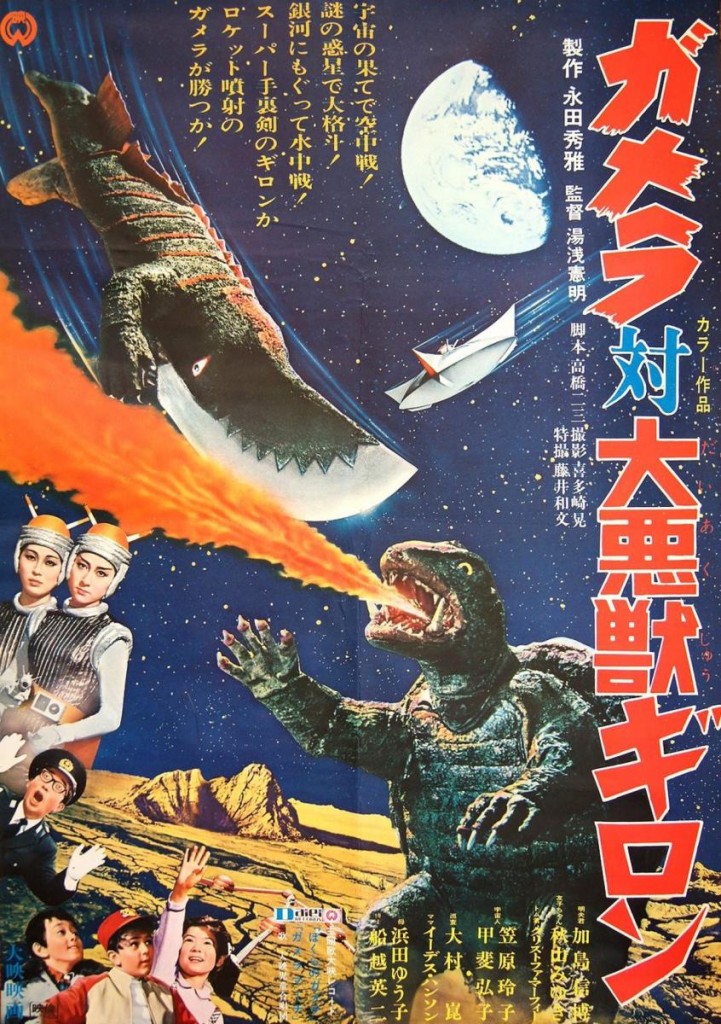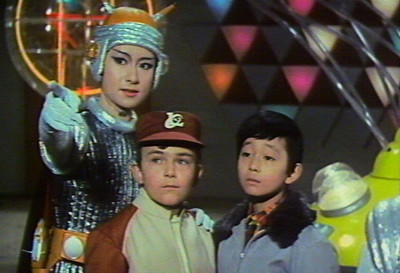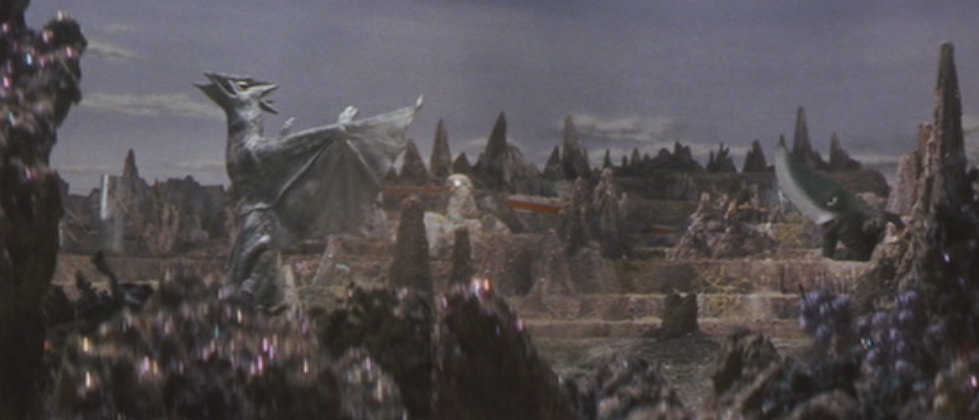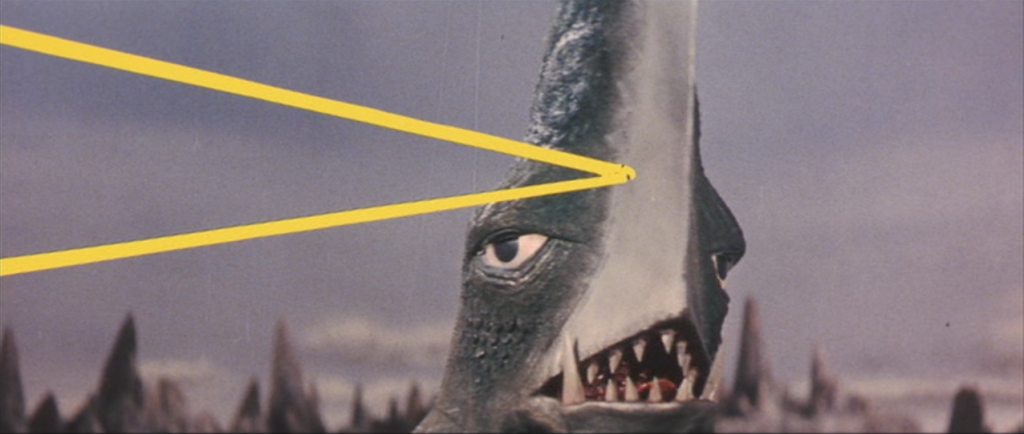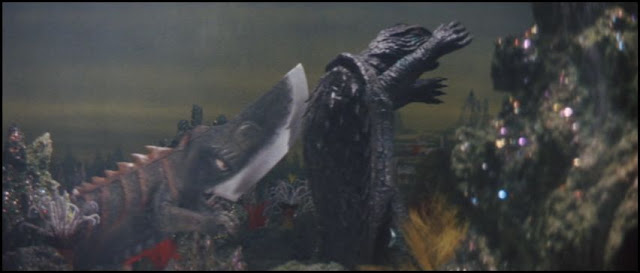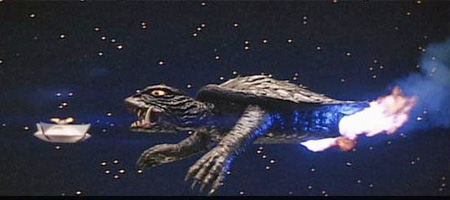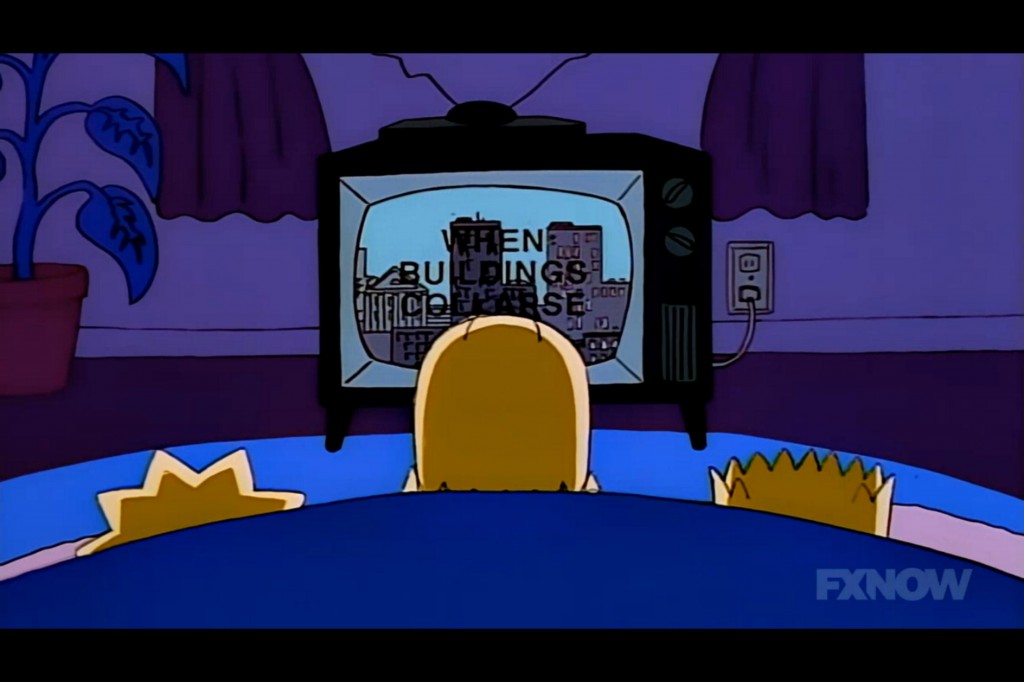Welcome to Angry Turtle!, a series featuring Deadshirt.net’s own Patrick Stinson and guest writer Andrew Tucker. We are going to be looking at the Gamera series, the films made by a rival studio to compete directly with the famous Godzilla series. The name comes from this charming video.
Andrew: Our journey into the Gamera series continues this week with Gamera vs. Guiron, and after the boring clip-bait that was Gamera vs. Viras last week, I have to say that I enjoyed this one. This movie committed to its outlandish sci-fi aesthetic.
Patrick: This was my one childhood Gamera film, and I only knew about the others from previews on the same tape. This was a fortunate happenstance. Guiron isn’t the most well-reviewed of the series, but it’s a great encapsulation of what separates classic Gamera from classic Godzilla. It feels like one of the wackier Choose Your Own Adventure books as far as tone and motif. Except for a few brief parts to basically frame the action, almost everything in this movie takes place in space or on another planet.
Andrew: The plot revolves around two young boys, Akio and Tom, who stumble across an alien spacecraft and are transported to the planet Terra, where two female aliens control the knife monster, Guiron, and are secretly seeking to escape to Earth. Akio and Tom are very similar to our protagonists from the previous movie, with one exception: Viras’s leads were spunky and energetic, while Akio and Tom are … less so. Akio is appropriately excited about space and aliens, while Tom seems to be on another planet at all times.
Patrick: There is something to having our space adventure kids be so comically upright and straightforward. However, watching the movie today, it’s clear that all of the acting talent of the lead pair is in the child playing Akio, whereas Tom is essentially mobile scenery. Sorry, kid (who’s probably a late-middle-age lawyer today — don’t sue!). Anyway, the kids are pursued to the planet of Creepy Alien Women by Gamera, who caught a glimpse of them while playing Space Policeman. By the way, the information about the solar system in the Japanese version of the film is surprisingly … accurate, as these movies go. The premise of the film is based around the discredited idea that there is a duplicate of Earth in our orbit, 180 degrees away, that can’t be observed. However, that hypothesis was put to bed recently enough so it makes a more than justifiable premise for a children’s fantasy film. It’s at least as plausible as your average National Treasure.
Andrew: I love it when you discredit kaiju movies with science.
Patrick: I’m being complimentary! The English version doesn’t come off as well, with a careless if common translation error causing the characters to constantly refer to planets as “stars.” Drove me bats as a kid.
Andrew: This plot is one that’s also used in the Godzilla series in Monster Zero, and it’s just the kind of premise I love for this era of Japanese monster flicks. It’s fun and exciting, and informs the viewer that they can sit back and accept the adventure ahead without question. It’s punctuated, maybe even more so than Godzilla, by having Gamera patrol our orbit. I just love that idea!
Patrick: I’ve always wanted to roleplay in a “classic kaiju era” setting where anything goes. The usual Simpsons like approach to continuity is in play, with Akio and Tom excited to find aliens for the very first time, yet recalling to those same aliens how Viras invaded the world last year. Anyway, let’s talk about what’s important — our two new monsters, Space Gyaos and Guiron.
Andrew: Right off the bat, this movie establishes Guiron as a greater threat than any before. Once on the alien planet, the boys are greeted by Space Gyaos! I was so excited to see him back after loving that movie so much. This series has a way of roping me in every other movie. This felt much more like a sequel to Gyaos, just like that movie felt like a sequel to the original Gamera. After Gyaos’s appearance, Guiron arrives and quite easily dispatches Gyaos into pieces with the giant knife on his head. He also chuckles at his victory! This guy is mean and also extremely dangerous.
Patrick: It’s very significant to have a new threat easily dispatch an old threat, which is why comics do it. Even with this as my only Gamera movie I could tell how powerful and brutal Guiron was. His destruction of the Gyaos is so gory that it’s actually censored in some cuts. But here’s the thing: He’s also dumb. You can see it in his eyes, his reactions, and the fact that he’s just a “watchdog” for the real villains. He’s a dumb, nasty character who’s just really good at fighting. Oh, and he has throwing stars. Given that they fit the blade motif, Guiron stands out as one of the simpler, stronger monsters as far as theme goes. He’s literally a walking kitchen knife. How do you punch that, or burn it?
Andrew: At first, his dispatch of Gyaos brought to mind the countless times Godzilla fights his arch-nemesis, the three-headed dragon King Ghidorah. Ghidorah is established as a mega threat in his first appearance, eventually taking the entire Toho kaiju cast to bring him down; but by the time the Showa period ended, he was Gigan’s sidekick and could be defeated by Godzilla and Toho’s Krillin, Anguirus. To contrast, Guiron deflects Gyaos’s devastating beam and hacks him apart. Space Gyaos is every bit as dangerous as the original, but Guiron is just that more lethal.
Patrick: I definitely think that this movie, being the second appearance of Gyaos and depicting the idea of a swarm of them, is the reason they were used as the main threat in the Heisei series. But with the Space Gyaos taken care of, the conflict is set up between Guiron and Gamera. Gamera is hell bent on bringing the boys back to Earth, and his flight through space to Terra is effectively intercut with the alien women executing their real plan — drug and devour the boys in their care.
Andrew: There’s a great bit of foreshadowing when the boys approach the alien planet as Gamera tries desperately to stand in their way. This, coupled with Guiron’s brutality and the space women’s brain devouring, raises the stakes in a movie otherwise resembling the more goofy sci-fi films of the ’50s and ’60s. It’s why I couldn’t get into Viras, but here they embrace the pulp-aspect of the genre. It’s creepy, there are desperate moments, but it’s also fun to look at.
Patrick: There is some really uncomfortable psychosexual stuff with the alien women. First of all, they are fanservice incarnate, presumably for the beleaguered parents in the audience. But it also sets up a Catwoman vibe, where they represent the future threat of a sexuality that the boys are still a couple years away from discovering. They get so far as to shave the head of a boy they have rendered unconscious (to get at his brainmeats, you see) before Gamera arrives for the rescue. In a movie where very little is real or grounded, this gives us palpable stakes.
Andrew: I took the space women to be oppressive parental figures. There has been a running theme of conflict between youth and adults in this series, and Gamera has always stood out as the Shadow-archetype of children, to me. The kids can project themselves onto Gamera, who protects them and fights for them and many times seems to be nurturing them. The boys return home in a spacecraft Gamera welds together and carries in his mouth through space like some kind of behemoth mother cat.
Patrick: This is after the climax, of course, where the boys much more effectively contribute than they did in Viras. Rather than just screeching Gamera’s name and suggesting tactics, they actually launch a missile that Gamera repurposes to finally stop Guiron, a monster that he has a very difficult time fighting. This makes it a much more effective use of wish-fulfillment. And can I just say that of all the stuff in this movie, Guiron chopping the spacecraft in half and Gamera welding it back together was the most damaging to my suspension of disbelief? But on the other hand … it’s perfect.
Andrew: As with all kaiju movies of this time, the writers seem to pick and choose without any real semblance of continuity when they follow logic and when they don’t. Earlier in the movie, after Guiron throws shuriken out of his head into Gamera’s arm, Gamera actually hesitates in pulling them out because they hurt so much. This was a really tender (heh) scene, for me, seeing Gamera struggle to recuperate. By this time, I’ve grown to really love that super turtle.
Patrick: Gamera’s vulnerabilities are on display here, as he fails to keep pace with the children’s spacecraft in the beginning, he’s put in tremendous pain by Guiron’s weapons, and can’t quite finish the battle on his own. It’s a very different vibe than the invincible Godzilla.
Andrew: Who also, perhaps not coincidentally, begins to get roughed up in his movies around this time. You mentioned before that the kids are actually useful in the climax, and I really did enjoy seeing them Scooby-Doo their way through their confrontation with the aliens, hopping in and out and around the teleporters in an attempt to outwit them. They weren’t just trying to escape, they were trying to outsmart them. As lackluster as the performance of the duo might have been (lookin’ at you, Tom), they were more interesting protagonists.
Patrick: Anyway, all’s well that ends well, and the children are returned to the care of the bungling incompetent adults that the movie kept cutting back to in order to slow down the action. Akio gives a wonderful little speech about how perhaps his utopia “without wars or traffic accidents” didn’t exist anywhere else, and we’ll have to make it happen here on Earth, while Tom continues to occupy space next to him. This is perhaps the most meme-filled of the Gamera series and inspired some killer Mystery Science Theater 3000 gags.
Andrew: We can’t walk away without at least mentioning the best human characters the series has seen yet, the duo of Akio’s sister and Officer Kondo. Akio’s little sister tries desperately to convince her parents and the authorities that her brother and Tom are in space, and in a surprising move by people who are presumably still recovering from an alien onslaught, they laugh her off. It’s only the cartoonish Officer Kondo that believes her, and they have a pretty heart-warming moment at the end of the movie. Sort of a nod to the importance of childishness in a world of cynical adults.
Patrick: We will see the series stick with the “two kids get into trouble” structure that has now proven itself, but get a more conventional kaiju adventure next time with Gamera vs. Jiger! Because we went almost a whole movie without any of the buildings falling down.

